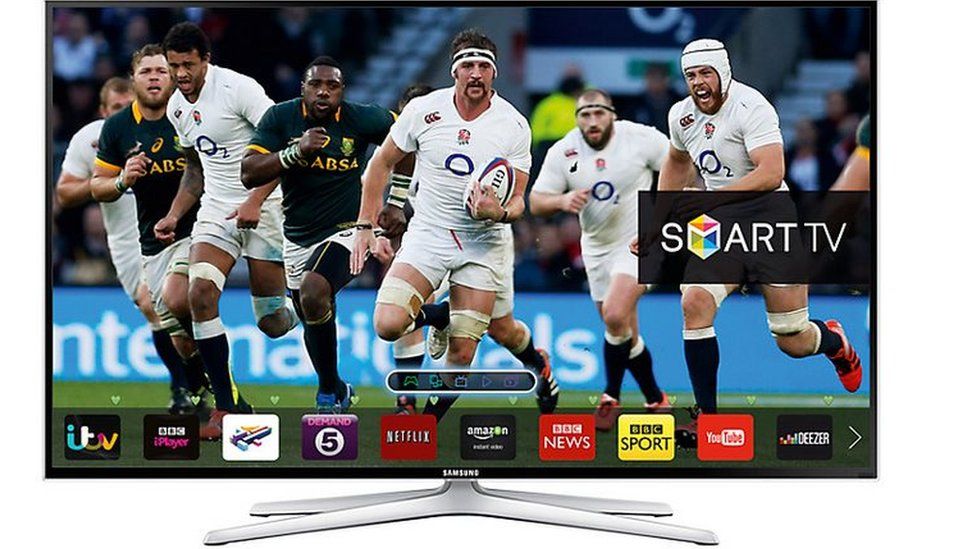EU probes TV makers over energy efficiency test scores
- Published

The European Commission says it is "following up" two reports that raise concerns that software used in TVs may be skewing their energy rating scores.
One study indicates that some Samsung TVs nearly halve their power consumption when a standardised test is carried out.
Another accuses a different unnamed manufacturer of adjusting the brightness of its sets when they "recognise" the test film involved.
Samsung has denied any wrongdoing.
It acknowledged that it used software that altered its televisions' performance during tests, but said this was the effect of a general energy efficiency feature that came into effect during normal use and had nothing to do with the testing process.
However, one environmental campaign group has likened the accusations to the Volkswagen diesel scandal, in which the German car firm admitted to programming its cars to deliberately cheat emissions tests.
Power drop
Televisions' energy efficiency ratings are based on the power they use while screening a 10-minute video, which contains a mix of fast and slow-moving content shown at different brightness levels.
Manufacturers run the test themselves and then file the results. Some of these are then double-checked by various countries' energy regulatory bodies.
The study involving Samsung was carried out by ComplianTV, a consortium that represents various non-governmental organisations including the UK's Energy Saving Trust (EST). News of the study was first reported by the Guardian newspaper.
ComplianTV's researchers found that the power demands of one of the South Korean firm's LCD TVs dropped from 70 watts to about 39 watts within a minute of the test video starting.
"That's not normal, it's an anomaly," explained Richard Kay, an EST spokesman.
But he added: "We don't have any evidence to back up the accusation that Samsung has a technology to recognise when it is tested."
Samsung said it "firmly rejected" suggestions that it had designed its TV settings to deliberately produce misleading power performance results.
But it acknowledged that "motion lighting" - a feature introduced in 2011 that controls TV screens' backlights - was causing the discrepancy.
"It is a standard out-of-the-box feature, which is switched on when the customer takes delivery of their TV, and remains on whenever the customer chooses to watch their TV in standard viewing mode," it said in a blog.
"It is a default setting which works both in the lab and at home; delivering energy savings and helping us to reduce our environmental impact."
Dimmer picture
The second study was carried out by the Swedish Energy Agency, which wrote to the European Commission to alert it of its findings in January.
The agency has not disclosed which company's televisions it tested.
But the BBC understands that sets belonging to a single manufacturer that was not Samsung were judged to "clearly recognise" the test film.
"These displays immediately lower their energy use by adjusting the brightness of the display when the standard film is being run," the report concluded.
"This is a way of avoiding the market surveillance authorities and should be addressed by the Commission."
'Brave new world'
The European Commission said it now planned to explore the two sets of findings.
"We will follow up both of them," Anna-Kaisa Itkonen, spokeswoman for climate action and energy, told the BBC.
"We will first of all verify if the problem has occurred. If it has we will estimate at what scale and whether the use of alleged defeat devices results in products being tested as compliant when they are in fact not.
"So, we therefore cannot yet judge the extent of the problem."
She stressed that at this stage the Commission had not launched a formal investigation.
One campaign group highlighted that UK regulators had raised concerns about some TVs adjusting their power-use during tests "to get a better energy label ranking" as far back as 2011.
"We've got government agencies appearing to find gadgets that detect test conditions, which smacks of the VW case," said Jack Hunter from the European Environmental Bureau.
"We're entering a brave new world of sophisticated, connected technology, which could be a great thing, but is also open to abuse.
"It's vital that government officials have the resources and a bullish attitude to ensure that everyone is playing by the rules."
- Published1 October 2015
- Published23 September 2015
- Published7 October 2015